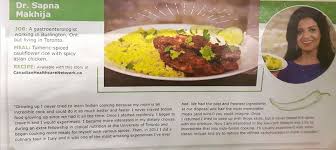Dr. Sapna Makhija is a Gastroenterologist who practices in Burlington, Ontario and an expert on gut health, including the deciphering of gastrointestinal symptoms that could indicate a correlation to COVID-19.
In our email interview, Dr. Makhija also expressed an interest in clinical nutrition and explained in our Q&A what gut health is.
She also shares gut health tips and what are the symptoms to watch for during the pandemic.
Q: How important is your gut health?
A: Well, you have to think of your gut as being the largest mucosal organ of the body. So anytime there’s any form of infection, it will affect your gut somehow.
So it’s very, very important.
And it’s actually gaining a lot of interest in the past few years amongst researchers, because not only do we feel like it’s involved with infection now, we feel like there’s also implications with other inflammatory diseases and potentially even hormonal diseases such as diabetes and insulin resistance and potentially even colon cancer.
Q: What kinds of symptoms of poor gut health are most common?
A: With COVID I think one of the issues that happened initially is that we didn’t think that there were any gastrointestinal symptoms.
Most healthcare professionals thought that it was all (respiratory). If you had a cough or fever, then there was a high suspicion of COVID, but not if somebody had nausea or diarrhea.
They found that diarrhea can actually be an early symptom of COVID and this wasn’t found until months later.
And then those patients who had gastrointestinal symptoms actually ended up having a worse clinical outcome because they waited longer to seek out treatment.
It is also not uncommon for gastrointestinal symptoms to linger for some time after the acute infection.
This is usually more common infections that may be related to food poisoning (such as Salmonella or Campylobacter infections), or gastrointestinal viruses.
This then often gets diagnosed as post infectious irritable bowel syndrome which can persist for a number of years.
We are definitely seeing an increase in irritable bowel symptoms, which also could just be related to anxiety this past year as well.
I doubt there is a single person who will say they haven’t been stressed or anxious in the past year.
Your gut actually has its own nervous system, called the enteric nervous system.
When it comes to COVID, I think the gut microbiome has become a huge area of interest because bacteria in your gut actually can affect the type of immune response you have.
So you have good bacteria and you have not so good bacteria.
Many scientists call the good bacteria, the anti-inflammatory bacteria, and the bad bacteria, the pro-inflammatory bacteria and these bacteria, depending on how your body responds to COVID can produce cytokines.
Cytokines are signaling messengers that regulate immunity and inflammation. So in some instances, the gut bacteria of COVID patients produced high levels of cytokines that could have contributed to their severe disease and cause respiratory failure.
Q: How much research has been done in relation to gut health and COVID-19?
COVID has just been around for a year, so it’s truly fascinating the amount of research that has happened in it, but it’s still fairly new.
I mean, every day, every week there are some landmark studies that are coming out in relation to the disease and how it affected the management of COVID patients, and now with regards to the vaccines as well.
It’s hard to study gut health because there are over one hundred trillion microbiota that are in your gut, that we call your gut microbiome. So how do you study that many species?
I think of the gut microbiome being as unique as your fingerprints, so everybody’s microbiome is different. 
So for researchers, even though it’s a huge area of interest, it’s also extremely difficult to adequately study.
Most of us have acquired our gut microbiome by the age of two.
Then, as you get older and as many external factors come into play, your gut microbiome changes over time.
Q: How do we keep our gut healthy?
A: Well, one thing that we know is that diversifying your gut microbiome is very important. And what I mean by that is having a mix of ‘good’ and ‘bad’ bacteria.
We can usually keep them in homeostasis or what we call gut harmony, to keep it functioning optimally.
One of the ways to do that is, I say, by eating the rainbow. That way you’re having a diverse mix of vegetables and nuts and seeds and legumes.
Also, ensure that you are consuming an adequate amount of fiber. Some fiber hungry, good bacteria can produce metabolites that are actually beneficial when it comes to memory and learning processes.
Fiber is extremely important, which the western diet generally lacks.
Other ways to improve gut health are by reducing ultra processed foods, reducing stress, which is probably the hardest thing to do; limiting alcohol and getting enough sleep and exercise.
Some smaller studies have suggested that even a two hour episode of acute stress can negatively affect your microbiome. 
Q: Do you have any additional tips for a healthy gut?
A: Well, I usually recommend that whatever way you can reduce the amount of stress in your body, is a positive change.
As I mentioned earlier your gut bacteria actually have their own nervous system.
So those neurotransmitters that are involved in anxiety & depression, such as serotonin- most of it is actually in your gut, not in your brain.
So the question is, is the poor gut health causing the anxiety?
Or is it the vice versa? We call this the gut brain axis and it is gaining a lot of interest over the past while as well.
There are even some studies that are looking into autism and the effect of the microbiome that could be linked with autism.
Q: Is their connection between the gut and the brain?
A: Definitely! It’s a very strong connection. Actually, it’s part of the reason that the term “gut instinct” came about.
Q: Is there anything else you’d like to add?
A: Definitely listen to your body. I think it’s been reiterated a number of times that the best way you can affect your gut health is by what you’re putting inside your gut in terms of your diet. The entire scientific world is very perturbed as to why India’s COVID cases have come down so drastically despite having over a 1.3 billion population and having the second highest number of COVID cases in the world.
We know that just like in the US there’s metabolic syndrome there and there’s diabetes and heart disease.
But is it the fact that their microbiome is different from ours in the western world?
Is it because the western diet has so much more processed foods which could adversely affect our gut health?
I think exercise for one thing is important as well for both your mental health, as well as gut health.
Some studies have suggested that even doing 150 minutes of moderate exercise a week can be beneficial on the gut.
Once again it’s important to consume more plant-based foods whenever possible.
Fitness Friday is written and submitted by Christine Blanchette who you can follow on Twitter as well as her Youtube Channel.
Stay Safe and enjoy the weekend.







